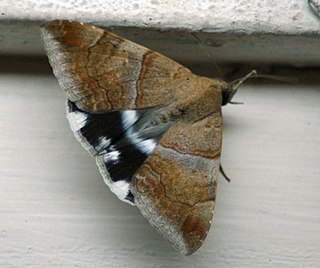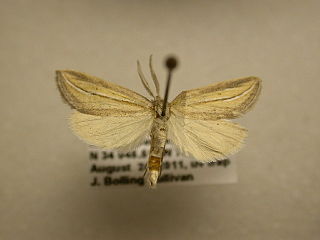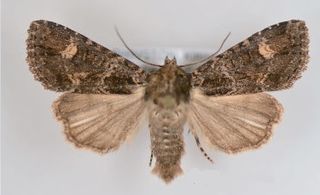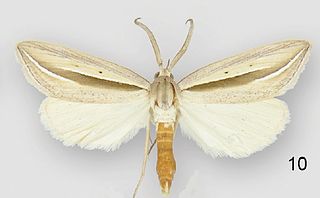
The flame shoulder is a moth of the family Noctuidae. The species was first described by Carl Linnaeus in 1761. It is distributed throughout the Palearctic from Ireland in the west to Siberia then Korea and Japan in the east.

Achaea janata, the castor semi-looper or croton caterpillar, is an erebid moth, the caterpillars of which are termed 'semi-loopers' due to their mode of locomotion. It is found from the Indo-Australian tropics and subtropics, extending south to New Zealand and east through the Pacific archipelagoes to Easter Island. It is a major pest of castor throughout the world.

Lygephila pastinum, the blackneck, is a moth of the family Erebidae. The species was first described by Georg Friedrich Treitschke in 1826. It is found in Europe and across the Palearctic Siberia, the Russian Far East, Japan and China.

Doryodes is a genus of moths in the family Erebidae.

Lygephila craccae, the scarce blackneck, is a moth of the family Erebidae. It is found in temperate Europe and across the Palearctic to the Altai Mountains, Korea, Japan and China.

Aseptis binotata, the rusty shoulder knot moth, is a moth of the family Noctuidae. The species was first described by Francis Walker in 1865. It is found widespread in western North America, west of south-central Alberta, Wyoming, and Nebraska. Along the Pacific Coast it occurs from northern Mexico to south-central British Columbia. It can be found from sea level to altitudes over 2000 meters in a variety of habitats from dense forest to shrub desert.

Doryodes bistrialis, the double-lined doryodes moth, is a moth of the family Erebidae. The species was first described by Carl Geyer in 1832. It is found in the eastern United States, including Delaware, Virginia, Mississippi and Florida. Its habitat consists of wet pine flatwoods and pine savannas.

Amyna axis, the oriental eight-spot, is a moth of the family Noctuidae. The species was first described by Achille Guenée in 1852.
Schrankia croceipicta is a species of moth of the family Erebidae. It was first described by George Hampson in 1893. It is found in Sri Lanka and the Seychelles.

Lophocampa sullivani is a moth in the family Erebidae. It is found in Ecuador (Pichincha) and Colombia.

Autoba abrupta is a species of moth of the family Erebidae. It is found in Papua New Guinea, Thailand, and Australia. The species is largely used by the name Eublemma abrupta in Indian and Sri Lankan texts.

Doryodes spadaria, the dull doryodes moth, is a moth of the family Erebidae. The species was first described by Achille Guenée in 1857. It is found in North America, where it has been recorded from coastal Florida, Georgia, North Carolina, South Carolina and Texas. The habitat consists of salt marshes.

Doryodes tenuistriga is a moth of the family Erebidae first described by William Barnes and James Halliday McDunnough in 1918. It is found in North America, where it has been recorded from costal Texas and Louisiana.

Doryodes desoto is a moth of the family Erebidae first described by J. Donald Lafontaine and James Bolling Sullivan in 2015. It is found along the Gulf Coast of the US state of Florida between Sarasota County and Gulf County. The habitat consists of coastal salt marshes.

Doryodes okaloosa is a moth of the family Erebidae first described by J. Donald Lafontaine and James Bolling Sullivan in 2015. It is found in the US in Okaloosa County, Florida and likely ranges south in the coastal brackish marshes toward the St. Petersburg/Tampa area and to the west along the Florida coast.

Doryodes fusselli is a moth of the family Erebidae first described by J. Donald Lafontaine and James Bolling Sullivan in 2015. It is found in the US state of North Carolina, occurring from Dare County in the north to Brunswick and New Hanover counties in the south.

Doryodes latistriga is a moth of the family Erebidae first described by J. Donald Lafontaine and James Bolling Sullivan in 2015. It is found in the United States in tidal creeks and salt marshes from Alabama to Louisiana.

Doryodes broui is a moth of the family Erebidae first described by J. Donald Lafontaine and James Bolling Sullivan in 2015. It is found in the United States from Alabama to southern Texas.

Doryodes reineckei is a moth of the family Erebidae first described by J. Donald Lafontaine and James Bolling Sullivan in 2015. It is found along the US Gulf Coast in the western panhandle of Florida along to eastern Texas. The habitat consists of Spartina marshes.

Amyna stricta, the eight-spot moth, is a species of owlet moth in the family Noctuidae. It is found in North, Central, and South America.


















